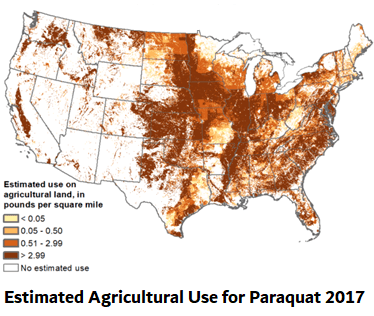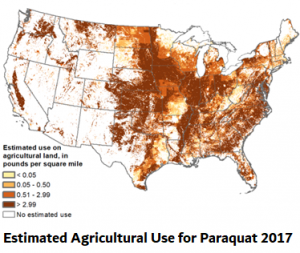 Several paraquat pesticide lawsuits are pending in the U.S. against Syngenta. The suits allege that paraquat, the chemical sold for weed killing, can cause Parkinson’s disease. Farmers use paraquat on many crops, including corn, soy, cotton.
Several paraquat pesticide lawsuits are pending in the U.S. against Syngenta. The suits allege that paraquat, the chemical sold for weed killing, can cause Parkinson’s disease. Farmers use paraquat on many crops, including corn, soy, cotton.On June 18, 2021, a notice of settlement was filed for several paraquat cases.
More than 400 lawsuits pending
The filed lawsuits name defendants as Syngenta, Chevron Phillips Chemical Co., Growmark Inc. Chevron sold Gramoxone paraquat products in the U.S. in an agreement with a Syngenta predecessor named Imperial Chemical Industries. ICI introduced Gramoxone in 1962. A licensing agreement gave Chevron the right to make, use, and sell paraquat in the U.S.
Below is a list of actions – as of August 2, 2021 – pending through Judicial Council Coordination Proceedings (JCCP):
- Harker v. Syngenta, et al. Case No. CGC-21-589755 (San Francisco Superior Court) (coordinated June 11, 2021)
- De La Vega v. Syngenta, et al. Case No. C21-01057. (Contra Costa Superior Court) (coordinated July 19, 2021)
- Louis Lombardo v. Syngenta et al., Alameda County Superior Court; Case No. RG21100757, filed on May 26, 2021 (coordinated July 19, 2021)
- Lonnie Owens et al. v. Syngenta et al., Contra Costa Superior Court; Case No. C21-01187, filed on June 4, 2021 (coordinated July 19, 2021)
- Borrelli v. Syngenta AG, et al. (Case No. MSC21-01217), filed June 24, 2021 in Contra Costa County Superior Court (coordinated July 23, 2021)
- Isaak v. Syngenta AG, et al., San Francisco Superior Court; Case No. CGC-21591254 (coordinated August 2, 2021)
- Rubino v. Syngenta, et al., Contra Costa County Superior Court Case No. C2101422 (coordinated August 2, 2021)
- Aguiar v. Syngenta, et al. Case No. C21-01373. (Contra Costa Superior Court) (coordinated August 2, 2021)
Multidistrict Litigation & Class Action
In April 2021, plaintiff lawyers filed a request with the U.S. Judicial Panel on Multidistrict Litigation in Washington, D.C. to consolidate paraquat lawsuits for pretrial proceedings in the Northern District of California. The case with the judicial panel is MDL No. 3004. The MDL panel approved the formation of the paraquat multidistrict litigation. The court was assigned to Judge Nancy J. Rosenstengel in the Southern District of Illinois.
In addition, plaintiffs filed a class action lawsuit in federal court in Iowa on May 3, 2021. That suit seeks “equitable relief in the form of medical monitoring, including, but not limited to, the costs of diagnostic testing” for farmers and others exposed to paraquat who are allegedly – according to the filing – at “increased risk” for Parkinson’s.
At least 87 lawsuits were pending in the MDL court as of October 25, 2021.
Science that links Paraquat to Parkinson’s
Several scientific studies have linked paraquat to Parkinson’s, including a large study of U.S. farmers overseen by different government agencies.
- The Agricultural Health Study (AHS) said it found “exposure to agricultural pesticides may increase a person’s risk of developing Parkinson’s disease.”
- In 2011, AHS researchers reported that “participants who used paraquat or rotenone were twice as likely to develop Parkinson’s disease as people who didn’t use these chemicals.”
- A more recent paper from AHS researchers stated that “Extensive literature suggests an association between general pesticide use and Parkinson’s disease (PD).
However, according to U.S. Right to Know, with few exceptions, little is known about links between specific pesticides and Parkinson’s disease.
What is Parkinson’s Disease?
Parkinson’s disease is an incurable progressive nervous system disorder that limits one’s ability to control movement. The disease causes tremors, loss of balance and, over time, it often leaves victims bedridden or wheelchair bound. Parkinson’s is not necessarily fatal, but it usually becomes severely debilitating.
Many people might remember how Parkinson’s slowly crippled boxing great Muhammad Ali, as well as a famous Hollywood actor. Michael J. Fox hoped to bring more public attention and private capital to combat Parkinson’s when he testified before the U.S. Congress in 2002.
In 2019, Dutch neurologist Bastiaan Bloem co-authored a book about Parkinson’s that blames widespread exposure to herbicides such as paraquat – along with other toxic chemicals used in agriculture and manufacturing – for the spread of the disease.
Acutely Toxic , Banned in Europe
Paraquat is also known to be toxic enough to kill people who ingest very small amounts. Though the sale of paraquat In Europe has been banned since 2007, the poison is sold in the U.S. as a “Restricted Use Pesticide” due to “acute toxicity.”
Litigation revealing Company Paraquat Emails
U.S. Right to Know reports that plaintiffs’ lawyers have obtained internal records from Syngenta and its predecessor corporate entities dating back to the 1960s. Though many of these documents are sealed, some have started coming to light.
The unsealed discovery documents include copies of letters, minutes of meetings, study summaries, emails. Most of the docs unsealed so far deal with corporate discussions about how to keep paraquat herbicides on the market despite paraquat’s deadly toxicity. Specifically, many of the documents detail internal corporate struggle over the addition of an emetic, a vomit-inducing agent, to paraquat products. Today, all Syngenta paraquat-containing products include an emetic called “PP796.” Liquid paraquat-containing formulations from Syngenta today also include a stenching agent to produce a foul odor, and a blue dye to differentiate the dark-colored herbicide from tea or cola or other beverages, to better prevent poisoning.
RELATED
- Parkinson’s Lawsuit | Paraquat Pesticide Attorney
- Paraquat linked to Parkinson’s Disease
- Paraquat: A non-selective killer with a Dark Past

by Matthews & Associates




